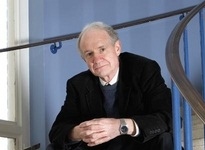Climate change, the IPCC, uncertainty and the built environment

A Laing O'Rourke Centre lunch-time seminar by Professor Geoff Levermore Institute of Energy and Sustainability
- Professor Geoff Levermore of the Institute of Energy and Sustainability – De Montfort University and MACE presented his lecture on ‘Climate change, the IPCC, uncertainty and the built environment’ during May 2013 as part of the Laing O’Rourke Centre for Systems Engineering and Innovation Lecture Series
Professor Geoff Levermore was the head of the Built Environment Research Group in the School of Mechanical, Aerospace and Civil Engineering, University of Manchester (2000 to 2011). He took early retirement and voluntary severance to support his terminally ill wife. He was appointed an Emeritus Professor in 2011. His wife died in 2011 and he has resumed part-time research, mostly on urban heat islands, and work on the CIBSE Guide A2 External Weather Data and is seeing through his remaining PhD students. He was recently appointed a part-time professor at the Institute of Energy and Sustainability, De Montfort University.

He was a Lead Author for the Intergovernmental Panel on Climate Change (IPCC, (UNEP, WMO)) Fourth Assessment Report (AR4) 2007, Working Group 3 (WG3): Mitigation of Climate Change, Residential / Commercial Buildings. He was a contributor to the award of the Nobel Prize for Peace in 2007 to the IPCC and Al Gore. He was founding co-ordinator of CIB (International Council for Research and Innovation in Building and Construction) W108, Climate Change and the Built Environment (one International Conference and 7 International Meetings), 2001 to 2007, Chair of the CIBSE Weather Group (1995 to 2006) and was a principal author of CIBSE Guide A Environmental Design, 2005. He was Principal Investigator (PI) of the EPSRC grant COincident Probabilistic climate change weather data for a Sustainable built Environment (COPSE) (EP/F038178/1, 2008-2011) and also PI of the EPSRC grant SCORCHIO: Sustainable Cities: Options for Responding to Climate cHange Impacts and Outcomes (EP/E017398/1, 2007-2010). In addition, he was PI of Tyndall grant IT1.8 and Co-I of three other Tyndall grants. This work has shown how future temperature increases due to global warming will have a significant impact on buildings’ performances and contributed to design guidance. The author of 58 refereed papers and 15 books Prof Geoff Levermore has managed EPSRC and other grants, since 1990, totalling £2,400,000 (as Principal Investigator).
The aim of SCORCHIO Sustainable Cities: Options for Responding to Climate cHange Impacts and Outcomes [Levermore, Lee, Lindley, Handley, Webb, MetO, Sheffield, Newcastle and East Anglia Universities] is to develop tools for analysis of adaptation options in urban areas, with a particular emphasis on future proofing (with respect to climate change) for mitigating GHG emissions, examining summer heat and human comfort (including the urban heat island effect) in the built environments of Manchester and Sheffield, UK.
The Joule Seedcorn grant, A review of smart electricity meters (2008-2009) [Levermore, Parkinson, Cook, Xu] (collaborators EATechnology and NW Design) reviewed electricity meters that could provide information for real time display of electricity usage, disaggregated into what appliances were actually responsible for the consumption. Work to date suggests that feedback of information on energy could save up to 10% of consumption but there is no work specifically on intelligent smart metering primarily because there are very few such commercial devices.
COPSE (COincident Probabilistic climate change weather data for a Sustainable built Environment) [Levermore, Watkins, Parkinson, Laycock, Napier, Bath, Sheffield and Northumbria Universities, MetO] looked at deriving and selecting future climate change weather data for building design and the urban heat island effect.
Manchester University and Tesco Sustainable Consumption Institute, Towards a zero energy supermarket (ZEST) [Levermore, Hill, Watkins, Parkinson, Wang and Turan]. A scoping study to examine achieving zero carbon supermarkets in the future and reducing the energy use progressively.
EngD project (2006-2010) Smart and low carbon sustainable homes with Barratt Developments [Levermore, Edwards, Glass] examining renewables for new homes.
Article text (excluding photos or graphics) © Imperial College London.
Photos and graphics subject to third party copyright used with permission or © Imperial College London.
Reporter
Ms Alexandra J Williams
Department of Civil and Environmental Engineering